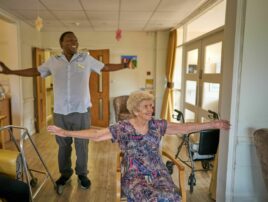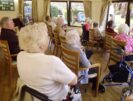
Wednesday 8th March 2023
Reimagining care falls to all of us
Dr Anna Dixon MBE is chair of the Church of England’s Reimagining Care Commission which explored how social care could be reformed. Here she shares the recommendations of the report, including the idea of a National Care Covenant which involves us all
Almost two years ago, I received an unusual phone call. The Archbishop of Canterbury, Justin Welby, was on the line. He and the Archbishop of York, Stephen Cottrell, were launching a Commission on Reimagining Care, tasked with developing a radical and inspiring vision for care and support, and he wanted to know if I was willing to chair this project. I didn’t have to think twice.
The opportunity to work alongside eight other experts drawn from a wide range of fields relating to care and support, and seek to develop a new vision for care and support, has been a privilege. We have listened to the experiences of people who draw on care and support, their families, and those who work in care, not only to understand the challenges they face, but to help to shape a vision of care and support for the future.
The challenges facing the social care system are numerous and complex. Even as countless reports have been written over the last 25 years setting out the need for reform, successive governments in England have failed to deliver much-needed reform.
The debate has been unhelpfully centred on the issue of people having to sell their house in order to pay for care which, though important, is a small part of a much wider problem with the way care and support is organised.
In its final report – ‘Care and Support Reimagined: a National Care Covenant for England’ – the Commission has presented three big ideas to reimagine care and support:
Rethinking attitudes to care and support
First, we must rethink attitudes to care and support. We made this our number one priority, because we believe it is impossible to address the challenges facing social care without challenging the underlying reasons why it has been perceived as a second-class service compared to the NHS. It is because as a society we do not value older people and disabled people as gifts to be cherished, but burdens to be managed. Too often we think that care and support is about other people ‘over there’, usually older people living in residential settings, when in fact care and support is about all of us: it’s everybody’s business. At different times in our lives, we will either be caring for someone or being cared for by someone. Care and support should not be limited to the practical tasks of washing, dressing, and eating, but include the wide range of personal, social and emotional support that enables us to live, work and play, regardless of age or disability. We must make more visible, and properly value, the full range of care and support, from the informal support provided by communities, the care provided by personal assistants in people’s homes, and the huge contribution of unpaid carers.
Rebalancing roles and responsibilities
Second, we must rebalance roles and responsibilities. We heard throughout our work that there is a lack of clarity when it comes to care and support and people do not know what is expected of them or where to go for help. Therefore, the Commission is calling for a National Care Covenant, a process of sustained public dialogue led by national government, taking its lead from the priorities of people who are most affected by care and support, which would set out clearly the mutual responsibilities of everyone: individuals, families, communities, alongside local and national government. We believe this is a game-changing idea, one which would make it clear that the care and support system must reflect our values and would ensure everyone is able to access what they need. Based on what the Commission has heard, we have made suggestions about what should follow as a result of the Covenant: more investment in, and emphasis on, community-based support; a new deal for unpaid carers; a stronger role for the state; and a renewed commitment to our responsibility as actively engaged citizens.
Redesigning the system
Third, we must radically redesign the way care and support is organised. Our long-term aspiration should be for a society in which care and support is free at the point of need, regardless of wealth or income, provided in a range of ways that reflects the diversity of care and support needs. In the meantime, we need a system that is simpler to navigate, with people who draw on care and support trusted to manage their personal budget, and a clear and consistent assessment process. We need a new approach to the workforce, which focuses not only on recruitment and retention, but also a renewed emphasis on values required to care well. All of this will require money, but one way or another we are going to be spending more on care and support as a society. We cannot afford to continue as we are, with the burden falling on people who draw on care and support and their families.
The Commission has focused on the importance of community. We must reject the false choice that care and support should either be provided by the state or by the family, but recognise the enormous potential of our communities in supporting people to live well. However, communities cannot do this alone, so we are calling for more investment in communities and for local authorities to see faith groups as trusted partners in providing a network of support. Over the course of our work, we had the privilege of visiting a number of community settings – including churches – which are providing fantastic support: from Certitude’s Connect and Do programme, which places an emphasis on peer-led support and people with learning disabilities doing the things they love, to Places of Welcome (overseen by Church Urban Fund), which provides neighbourhoods with places where all people feel safe to connect, belong and contribute. I believe that the key to the success of these projects is that they focus on assets (what people can do and want to do) rather than deficits (what people cannot do) and help people to discover their gifts and passions.
The task of reimagining care is far from simple and will not happen overnight. We believe that a National Care Covenant, with its focus on relationships, mutuality, and interdependence, will take us towards a place where everyone, regardless of age or ability, can live a full life. We would be grateful for your prayers and partnership in this work.
Please pray
That Christians would consider how they might be involved in reimagining care.
More thought leadership from Pilgrims' Friend Society

Reimagining Care - what does it mean?
A new report from The Church of England calls for radical reform to the social care sector

Letter to Jeremy Hunt from Shottermill House, Haslemere
Our family members at Shottermill House have shared how they are praying for Jeremy Hunt, the new Chancellor of the Exchequer and their local MP








































